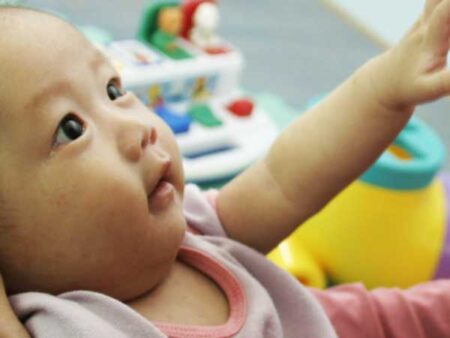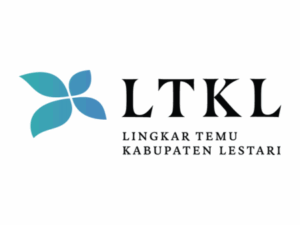OneSky for All Children supports low and middle-income communities with early childhood care and education programs, such as caregiver trainings. The organization is working to address a gap in early childhood development information and in support and recognition for caregivers.
Morgan Lance of OneSky for All Children spoke with Lissa Harris on February 16, 2023. Click here to read the full conversation with insights highlighted.
Lissa Harris: Can we start out with you introducing yourself and your project and talk a little bit about the problems that you’re trying to solve in that space?
Morgan Lance: I’m Morgan Lance. I’m the CEO of One Sky for All Children. We are an organization that works in Asia in low to middle income countries, bringing early childhood care and education programs to communities in need. The program that we’re focused on at the moment is childcare provider training in Vietnam, and soon Mongolia, as well.
The lack of childcare is a crisis globally. But in low income communities, it’s even more of a dire need. Where we work in Vietnam, for instance, in industrial zones, there are hundreds of thousands of women working in factories for very long hours and for very low wages. They tend to be migrants from rural communities into the large cities and industrial zones. When they get to those new places, those new locations, they don’t have residency status so their children aren’t eligible for public services, which means in order to find care for their children while they work, they often resort to home-based childcare, which is a new industry that’s sprung up in Vietnam. These are run by women who are very well-meaning and very caring, but don’t generally have any education in child development and are lacking any support to run their businesses.
What we sometimes see are one to two women looking after up to 20, sometimes even 30, children between the ages of six months and six years of age with very little in the way of support. We began a childcare provider training program, training women based on a curriculum that we developed over 20 years of working in the child welfare system in China. We began partnering with the government in Vietnam, the Ministry of Education and Training, to envision taking this model to scale by training the government to deliver the program and to help provide monitoring of childcare providers throughout the country. We’ve just taken our first step, which is working with the government to co-author the National Standards for Childcare in Vietnam.
Lissa Harris: So you’re working on policy, you’re working with government agencies, but you’re also working directly with childcare providers on this training? Can you talk a little bit about how they benefit from the services that you’re providing them?
Morgan Lance: Exactly. It’s both a top down and a bottom up approach at the same time. On the ground we’re providing childcare providers with a 20-week-long training program that’s a blend of in-person classes led by our senior trainers, site visits to the actual home daycare by our staff for coaching and mentoring, and then an online learning platform that we built called One Big Family that connects all of our trainees in an ongoing community of practice and provides resources to them for as long as they care to be connected to the program. What they get is training in early childhood development based on global best practices. Training on classroom management, which if you can imagine having childcare where you’ve got six-month olds and six year olds all in the same room. Just some simple practices about setting up different learning stations for different age groups in different parts of the room can make an enormous difference to the stress and the workload of the caregiver and to the benefits for the children.
Our senior trainers also come and meet with each trainee at their home every other week, which is a huge benefit. They feel less alone, they feel supported, they’re getting on the spot advice. We’ve also built an app that allows our trainers to track the progress of each childcare provider on site, and then share with them insights and also highlight things like safety issues at their childcare, or places where they could make easy adjustments that would improve both the care for the children and the working environment for the childcare provider. Finally, at the end of this process, the childcare providers go through a graduation ceremony that is conducted jointly between ourselves and the local government.
They get a certificate of graduation cosigned by both of us. And you really can’t overstate how exciting this is for a childcare provider who may not have gone through schooling past the high school age to now be at a government ceremony where they’re being awarded with this certificate as an early childhood educator, and their status in their community changes so dramatically, and within their families. It’s wonderful to be at these ceremonies and see husbands and fathers looking at their wives and daughters in a whole different way, as professionals, as teachers. It’s pretty cool.
Lissa Harris: Can you talk about what makes your approach distinctive from other groups working in this space?
Morgan Lance: There are many groups working at the policy level trying to embed childcare into government systems. And there are many groups working at the grassroots level in terms of training childcare providers or helping women set up new childcare programs. Our program is unique in that we’re working at both levels, and I think that makes the possibility for systemic change very real. We are about to trial a government-led implementation of our grassroots childcare training. If it works well, it is going to be scaled across the entire country of Vietnam. And Mongolia now wants to follow suit and has asked us to help them understand what we’re doing in Vietnam and to potentially create a similar program for Mongolia. We’ve also had an invitation from the Philippines. We see this as something that’s going to be able to scale to many countries in Asia, and potentially be a model for other countries in the world.
Lissa Harris: I wonder if you could talk about a particular example that really illustrates the impact of your work for the people that you’re serving?
Morgan Lance: I can think of childcare providers who we have worked with who felt very alone, very isolated. You can imagine if you are spending 14 hours a day, six days a week taking care of children with very little interaction with other adults, it can be a little bit isolating. One particular childcare provider in Vietnam, in Da Nang, who was feeling quite overwhelmed in her business. And seeing her after she had gone through our training, visiting her childcare center, and seeing this room that was no different than the one she started with, but was now set up with learning stations with children that were being actively engaged and learning and not just sitting and being fed and watching TV all day, which is the norm in home-based childcare in Vietnam. Hearing her talk about her engagement with our trainers, with other childcare providers that she had met through the program, and explaining what she had learned from her peers. You could see there was this whole change in her in terms of feeling that she had moved from, maybe a status of babysitter to a status of professional teacher. It was pretty amazing.
Lissa Harris: Can you talk about the insights or the teachable lessons that can be taken from your work that other people, who might be working in either in this space or on different kinds of problems, might be able to use and employ in their own work?
Morgan Lance: First and foremost, working with the government is the key to systems change. And when working with the government, it’s really important to find champions at multiple levels because there’s often turnover within government agencies. You can have a great champion who is ready to help carry your work through, and then they leave or their role changes, and suddenly you’re starting from scratch again. First and foremost, really take the time to develop those relationships at multiple levels within the government of whatever country you’re working in.
At the moment, we work with Provincial Departments of Education and Training, Central Ministry of Education and Training. In Mongolia, similarly, we’re working with both the Ministry of Labor and the Ministry of Education because some of the early childhood development programs pass back and forth between those two ministries every few years. Having touchpoints in multiple ministries and at multiple levels is important. The other thing I would say is the most critical thing is to have really good local leadership, and to listen to them and let them lead the way. Our country director, Yen Vu, is extraordinary, and I learn from her every day. The way that we’ve set up our program is that our global team creates the support that Yen and her team in Vietnam need to make this happen and not the other way around.
Lissa Harris: How do you measure your success? What’s the evidence that you’re making progress?
Morgan Lance: On a very practical level, we look at our beneficiary numbers. We look at the number of adults who have gone through our training in the last 25 years. Over 75,000 adults and over 280,000 children directly benefited by our work. In addition to looking at those beneficiary numbers, we have a robust internal monitoring program that was set up with support from ID Insight. We have data dashboards where we are able to get real-time information on our training in any province, see where extra support is needed. We also have done external evaluations of our work in both China and Vietnam, most recently an external evaluation of our childcare provider training program in Vietnam by Harvard, and are actually in the process of designing another randomized control trial for this next government-led model. External evaluations are simply a snapshot in time, and they’re important in some aspects. But really for us, what’s important is the day-to-day gathering and monitoring of data so that we can have a continuous learning cycle.
Lissa Harris: What kind of data is that dashboard reflecting? What kind of metrics are you tracking in real time?
Morgan Lance: We’re looking at things like change in caregiver attitudes, knowledge gains. There’s surveys that are being conducted. Also, our senior trainers are looking at environmental safety and environmental setups inside the childcare centers. We are tracking certain child development indicators, although there’s a big debate in this type of work around how much is really trackable in populations where there’s a lot of movement in and out of communities. But we do track [these indicators]. We’re about to start adding in some nutrition training content through a partner organization, Spoon. We’ll be looking at that as well and how nutrition impacts child development.
Lissa Harris: Every social innovator learns from things that don’t work, as much as things that do. Can you describe something that you tried that didn’t work that you might have learned an important lesson from that maybe other people could learn from also?
Morgan Lance: We had a vision of creating a demonstration childcare center in Hong Kong. We have one in Vietnam. We have something similar in Mongolia, a family center. And we thought we would develop one in Hong Kong that could be a model where governments and NGOs from other parts of the world could come and see best practices. We did community round tables and lots of research and really looked into the needs. I think we didn’t properly understand what it would take to set something like that up in a city like Hong Kong and what the cost structure would look like.
We were halfway into the planning when we realized this doesn’t make sense. We aren’t probably [in the] best place to start this project. There are probably NGOs already working in Hong Kong that might have a better connection to the government, a better connection to funders, to set this up. So we ended up having to pivot. We still have a fabulous program in Hong Kong, but it’s quite different. It’s a family skills training center now instead of a daycare center. It goes back to what I was saying, initially, about working with the government. We are very committed as we’re developing our three-year strategic plan to not going into any new country or new project without a government partner from the start because that really is what makes everything possible for us.
Lissa Harris: Which speaks to what you were saying earlier about the importance of having those tight relationships at multiple levels of government or multiple agencies that shepherd your project along.
Morgan Lance: Exactly. And we did not have that in Hong Kong. We met with the government, but we didn’t have those government champions that we needed from the start.
Lissa Harris: Setting aside the issue of funding, because funding is always a challenge for somebody trying to make systems change, are there other kinds of challenges that you’re facing that you haven’t yet been able to overcome, like issues of scale or opposition from the community, or political opposition, public reception, things like that?
Morgan Lance: Setting aside funding, which is the big issue, and I think our team may even say it’s the only issue that we’re really struggling with for these kinds of projects. But beyond that, I would say that the one issue we run into is there are not enough ECD training schools in Asia right now to train trainers. We’re finding that when we are going to hire senior trainers to start a project in a new province or a new country, it’s often hard to find those people locally. We don’t want to bring our trainers from other countries into a new setting. We’d really like to support local talent, but it’s sometimes hard to hire for the roles that we need to hire for in the country.
The teacher training programs in the countries we work in often don’t look at the early years. They’re starting their teacher training with primary school teachers. But that zero to six age group often doesn’t have a real educational component, an educational framework, built into the country’s educational systems. So, people aren’t thinking, “I will go to school to become an ECD specialist or a preschool director.”
Lissa Harris: Can you talk more about how you’re working to advance systems level change on the problems that you’re tackling?
Morgan Lance: Working at the policy level is incredibly important for us. In Vietnam, we have just worked with the Ministry of Education and Training to lead a working group that co-authored new standards and curriculum for childcare across the entire country. Beyond our program work, this is information that’s now going to inform every childcare provider in every province in Vietnam. Over half of the curriculum contained in the standards is One Sky’s curriculum that we’ve developed over our 25 years of working in Asia.
In addition, we are going to be training the government to implement our program. We’re going to start with a pilot model in five provinces once we’ve secured funding, and running an RCT on that program with the hopes that we’ll be able to produce evidence that this training of government trainers model really works, and can and should be scaled across all of Vietnam and potentially adapted to scale into other countries, as well. On the advocacy front and the networking front, we’re very involved with ECTN and ARNAC and lots of different platforms that are advocating for more focus on childcare in low to middle income countries.
Lissa Harris: When you’re talking about scaling and rolling out your solutions to larger stages, to new countries, and especially in training the people that are delivering this on the front lines, I feel like there’s some tension there, right? You’re bringing some expertise and the history of what you are doing to the table. But, like you said, you don’t want to go in and say, “Okay, we’re going to impose our approach on you without local leadership or without being driven by people who are already embedded in the community.” I wonder if you could just talk a little bit about that, the push and pull between those.
Morgan Lance: It’s something that we’re talking about and thinking about all the time. The way that we’re structured is that we have a global team who creates core curriculum and creates core operational procedures. But then, in each country, we have a local leader who works with our global team to help say, “Yes, this is the part of the curriculum that’s going to work in this country. And then we contextualize it. We translate it. We have, for instance, a large video resource library that we use on our online learning platform. Those videos are adapted for each country that we work in.
We rotoscope them so that the children’s faces don’t have features that might make them obviously connected to one country or another. They’re generic and everything’s translated. We also make sure that everything on the operational side is also contextualized to the local communities. While we have certain policies and frameworks and best practices, those are all offered as tools for the local teams to use and to adjust and adapt as they need. That’s a really important piece of making sure that this is a scalable model, that it’s adjustable, that it’s flexible, and that it always is contextualized for the local community’s needs.
Lissa Harris: What do you think is most needed from other actors or partners to advance systems level change on this front?
Morgan Lance: I think that two things are needed. Continuing education on the importance of early childhood development and the fact that we know that any action, in terms of increasing early childhood development opportunities, has a multiplier effect on both the child’s life and the community. That global education, letting governments know this really is something that needs to be focused on. Education doesn’t start at grade one, at age six. It really starts from birth, and we need to be paying attention to that. What’s happening is there’s a local understanding of this, and there’s even a local education ministry’s understanding of the need for early childhood development programs. But, generally, what happens is at the central government coffers level, there’s not a will to provide funding for these kinds of programs. So continue global advocacy, continue global education on the importance of this work is vital to systems change.
Lissa Harris: How do you see your work evolving over the next, say, five years?
Morgan Lance: Currently, we’re working in China, Vietnam, Mongolia, and our new site in Hong Kong. We plan to add probably two more countries to that portfolio with a focus on this childcare issue. At the moment, in addition to doing childcare provider training, we’re looking into expansion of childcare services. How can we help entrepreneurial women set up their own quality childcare programs, and how can we support them? In addition to that, we also provide family support like family skills training, parenting support, and looking at how those two pieces can expand in parallel. The third piece, which is a little bit of an outlier, is going back to our roots. We started our work in the welfare system in China. That’s what our founder, Jenny Bowen, received a school award for was her work within the orphanage system. And we’re looking at how we can support other countries in re-imagining their welfare systems, as well as moving children out of orphanages and into foster families.
Lissa Harris: We’ve covered a lot of ground here, but is there anything that we didn’t talk about that you thought was important to add?
Morgan Lance: I’d love to add that in the global development community, and especially in the funding community, Asia sometimes doesn’t get as much attention as I think it should. There are incredible challenges there, and also incredible solutions that are bubbling up that could be useful all over the world, both within the ECD space and other spaces in the social impact arena. I would just say keep an eye on Asia. It’s an important part of the world.
Click here to read the full conversation with insights highlighted.
Lissa Harris is a freelance reporter and science writer (MIT ’08) based in the Catskills of upstate New York. She currently writes about climate, energy, and environment issues from a local perspective for the Albany Times Union, her own Substack newsletter, and various other digital and print publications.
* This interview has been edited and condensed.
Learn about other organizations that are working on social innovations in early childcare.







